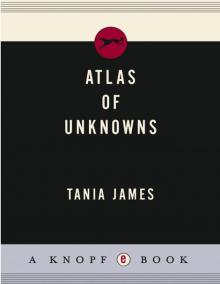- Home
- Tania James
ATLAS of UNKNOWNS
ATLAS of UNKNOWNS Read online
To
Koduvathara L. James, my father
Mariamma K. James, my mother
and
Christine, Neena, & Raj
By me, the hemispheres rounded and tied, the unknown to the known.
—WALT WHITMAN, “Prayer of Columbus”
Silence is the keeper of the keys to secrets.
—AGHA SHAHID ALI, “Things”
Contents
I.
ORIGIN
II.
ORIENTATION
III.
WEST WINDS
IV.
TRUE NORTH
I.
ORIGIN
Kumarakom, Kerala, India
1995
1.
HE DAY BEGINS WRONG. Melvin feels it upon waking, as though he has slipped his right foot into his left shoe and must shuffle along with a wrong-footed feeling all day. That today is Christmas Eve brings no comfort at all.
It is not the first morning to begin this way. Throughout his forty-five years, Melvin Vallara has periodically awakened to a nuisance in his stomach, an inner itch of ill portent that could bode anything from a bee sting to a gruesome bull-on-bus accident. Both events occurred on his seventh birthday, and he still has not forgotten that bull, how it bounced on its back before landing on its side.
This is what the Bible says: I tell you the truth … no prophet is accepted in his hometown. Nor, Melvin would add, in his own family. His mother believes that the inner itch has more to do with gas than foresight, and like her mother before her, Ammachi calls upon an arsenal of unwritten remedies. She prepares a murky white goo from the boiled grounds of a medicinal root, while her granddaughter Linno watches from the doorway of the kitchen.
“Which root?” Linno asks.
“The name, I don’t remember. A multipurpose root,” Ammachi decides, borrowing an English phrase she heard in a Stain-Off! commercial, one in which a cartoon soap sud possessed eyes and a smile.
Linno delivers the bowl of multipurpose root goo to her father, who is draped across his bed, an arm over his eyes. When he sees the bowl, he responds by turning away, onto his side. He is a man of few words, but clearly he and the goo have met before.
Linno believes. She is thirteen and dutiful, convinced that part of her duty is to champion her father’s prophecies, even though he lacks the frothy beard and brooding of biblical prophets and his name falls short of the weight and might of an Elijah or a Mohammed. In fact, he more closely resembles the icon of a gloomy-eyed saint: slight, balding, his forehead growing longer by the year. Linno tries to make up for the little attention he gets by bestowing as much as she can, so she supports his decision to stay home from morning Mass. She also hopes that Ammachi might let her support him from home.
It is not to be. In the end, Linno leaves along with the rest of the family and returns from church to find Melvin still asleep, his hands in fists by his face, as if to pummel ill fortune away.
BUT THEN, there is the Entertainment to consider.
Melvin forgot to purchase the Entertainment from the Fancy Shoppe the day before, and now here they are—Linno and her younger sister, Anju—home from morning Mass with less than sixteen hours until midnight Mass, and no Entertainment? Unacceptable. Unfair. The Entertainment is tradition, a promise upon waking, a beautiful, blinding answer to the holy punishments of morning. Without the Entertainment, there is only the looming threat of carolers who travel from house to house, proud as roosters in their red mufflers, belting melodies and collecting church donations all through the night.
Late afternoon breezes swell the sun-gilded trees that lift and sigh, sifting the light between their branches. There is still time left in the day to visit the Fancy Shoppe, if Melvin can be persuaded. Ammachi refuses to go back out once she has unpinned the Christmas brooch from her shoulder, a brass dove that she nests in its velvet-lined case, where it will remain until next Christmas Eve. She removes the embroidered shawl draped over her shoulder and goes about the house in the white chatta and mundu that all Syrian Christian women used to wear, so few now still starching their blouses and pleating their wraps despite the patterned profusion of saris surrounding them.
Her brow still furrowed from the severity of her worship, she sits in a plastic chair, her eyes closed, her swollen, lotioned ankles perched on the daybed across from her as Linno reads aloud from the newspaper.
Ammachi takes pleasure in knowing the happenings of district politics, lambasting corrupt politicians as if they are standing before her, a row of sulking children. But lately, large-scale developments have been attracting her rebuke, particularly new plans for the construction of a national highway, a network of roads and bridges, three to six lanes thick, that will send vehicles speeding from Kashmir to Bangalore, and west to east in a third of the usual time. “With double the waste,” Ammachi warns. Examining the map, the dark passages splayed across the country, she rejects its unpronounceable given name—the Golden Quadrilateral—and coins it instead “the Golden Colon.”
During Ammachi’s indictments, Linno sketches her grandmother along the margins of the newspaper, paying special attention to her bun, a silver-gray swirl that maintains its integrity without help from a single hairpin. These sketches interest Melvin more than the news itself, so much so that he neatly tears out and saves his favorites. Gracie, his wife, used to tease that he would turn anything, even a bottle cap, into a souvenir. He is sure that had Gracie lived to see these sketches, she would have saved them as well. They seem to belong to the hand of someone much older, who understands not only the anatomy of the face but the way muscles hold emotion, the way eyes possess life. He keeps the drawings in a faded cigarillo box that bears the face of a mustached white man on the lid.
WHILE LINNO DRAWS Ammachi, Anju follows her father through the bedroom, the sitting room, and even hovers around the outhouse, reciting in English from the Book of Isaiah as he does his business. At nine years old, Anju is a valiant Bible Bowler, her brain an unbeatable vault of Scripture that she draws upon to give herself authority, even when faced with a sighing audience. Unlike Linno, Anju will not accept defeat; at least five times a day, she pulls on the tip of her nose, believing that her efforts will somehow win her a straighter one. With similar persistence, she follows her father into the sitting room, translating and interpreting the text as verses of fortitude and godly reliance, closing her case with the reminder that he never got her a birthday gift.
When logic fails, Anju’s argument devolves. She whimpers, tugging at the hem of her T-shirt (“Eddi, stop stretching it!” Ammachi warns), and threatens to run away, which is a predictable threat, as she is always running away and Linno is always sent to fetch her. The only mystery lies in which neighbor’s house Anju might choose as her sanctuary. Usually Linno finds her sitting on someone’s front step, bleakly toeing patterns in the dirt until she spots Linno in the yard. Anju always comes away quietly, gradually softening beneath the weight of her sister’s hand on her shoulder. Sometimes, after a silence, Anju will ask, “What took you so long?”
Melvin retires to the daybed with his arm over his eyes while Ammachi lectures, while Linno draws, while Anju continues to flit around him with her runaway threats, until at last he says, “Enough.” Melvin sits up and rubs his eyes with his fists, muttering that it is better to disappoint God than to disappoint daughters. “At least God forgives.”
LINNO ACCOMPANIES HER FATHER to the Fancy Shoppe, riding sidesaddle on the back of his bicycle, her heels held away from the spokes. They cut through mingled smells of dung, earth, freshwater, pesticides. They bump along between paddy fields that, in stillness, reflect the sky’s blue with such clarity that grass seems to spring from liquid sky. At the water’s edge, a
medley of palms bends low, each falling in love with its likeness, while webs of light spangle the dark undersides of the leaves. Whenever a bus appears on the horizon, Melvin pulls over to the side and waits for it to groan past, spewing dust and diesel in its wake, before he plunges his foot down onto the pedal. Her view of the road is blocked by his shoulders, dark and tense all the way down to the unsettling clutch of his fingers around the handlebars.
Linno wonders what kind of gut feeling struck Melvin on the day her mother died. Perhaps he had seen her funeral face in dreams, with skin so spackled over with paint that she seemed a porcelain replica of the person she had been. Here was her lineless forehead, every wrinkle erased like a past swept clean. Here was her tiny smile, as though amused by a secret.
After the funeral, the albums were all packed away in trunks, but a single photo of Gracie remains within reach: the newlywed photograph, a black-and-white double portrait that every couple took in those days, tucked in a back pocket of Ammachi’s Bible. Gracie appears vaguely pretty but in a sharp, plain way, considerably shorter than Melvin, and cheerless. Husband and wife stand next to each other, shoulders touching, gazing sternly up into the camera as if being summoned into battle.
· · ·
THE ENTERTAINMENT COMES in a paper bag, folded down and stapled shut. Linno and Anju spend the evening dutifully guarding the bag from interference, though no one wants to interfere more than they do. Fixated on the bag, they shove wads of chapati into their mouths. They argue over who should hold the bag and how. Anju tries to educate Linno about a rarely read passage in the Bible, which suggests that younger sisters should always get their way. Anju is a strange little sieve of general knowledge, continually dribbling answers to questions that no one has asked. This one Linno knows not to believe, just as she didn’t believe it that last time with her Cadbury Fruit & Nut.
After dinner, the girls have no choice but to wait on the front step, swatting at mosquitoes, the Entertainment placed equidistant between them. Theirs is a small brick and stucco house with a thatched ola roof, humbly crouched among the slanting coconut trees that are charming by day yet spindly, looming and long-armed by night. Two lanky tree trunks span the brook in front, making a shaky footpath that the girls race across, testing their balance and bravery, light as birds on a branch.
AS THE NIGHT SOFTENS WITH FOG, the family collects on the front steps. Dragging a plastic chair behind her, Ammachi mutters that this is a show she has seen before, and what it has to do with Yesu’s birth she does not know. For the first time in history, Melvin allows Linno to assist him, while Anju is told to sit on the steps. In mute protest, Anju takes a pose beyond her nine years, legs crossed, head tilted, fingers laced around her knee, like a woman in a magazine.
From the paper bag, Melvin lifts a parcel whose label displays two words in red block letters: rainbow thunder. Out of the parcel, plastic crackling, Melvin pulls a bundle of sparklers.
These Linno lights as reverently as if she were lighting candles at church. All else around her dissolves into shadow and there is only the single captive star, its spitfire warmth belonging, however briefly, to her alone. Even Ammachi accepts a sparkler and, equally transfixed, begins circling hers in figure eights, watching the wild spray of orange light, frowning a little when it dies to a glowing ember.
And then, what fire! One aerial miracle follows the next. There is the Volcano—a small cone that splutters before erupting into a great geiser of liquid flame, rising, rising, borne on a splendid gushing noise. The Mouse, which Melvin lights from the throat of an empty toddy bottle, a faint sizzle before the white-pink bullet shoots into the trees and spirals over the branches. And finally, the Necklace, a length of tiny dynamite that Melvin ties to a low branch of the jackfruit tree. When he lights the fuse, everyone plugs their ears against the sound, a violent rifle crack, mercilessly loud as it pop-pop-pops all the way up to the branch.
A silky smoke roams over the ground as Ammachi murmurs, grudgingly, that firecrackers are not so bad. “But if it were me, I would buy a nice set of mugs over these light tricks any day.” In a rare embrace of Western custom, she cites the examples of other countries where the father gives Christmas gifts to the entire family. Even his mother.
Melvin points out that his sister, Jilu, is American. “When was the last time she gave us anything?”
“Hah, Jilu was American! Now she is in Canada. And what do you mean anything?” Ammachi rattles off a list of items: “Soap, socks, a fitted sheet, Tang …”
“Those socks were used. And that fitted sheet fit only half a bed.”
While Ammachi and Melvin argue over Jilu’s largesse, Linno begins untying what is left of the Necklace from its branch. Several links remain on the blown fuse.
Anju calls out, “Eh, Linno, we already lit that one.”
Linno is studying the remnants of the Necklace when she looks up at Anju, then at her father. She is pinned, suddenly, by the look of fear in a grown man’s face.
“Drop that—” Melvin says, or begins to say, she cannot tell.
Because from this point, everything happens with a slow grace, in the space of seconds. Linno feels nothing and sees everything, in all its strange clarity. The links exploding in her palm, fire flowering and blazing above the watch that she wears facing in so she can check the time discreetly when she is at school. The face of the watch, splashed with light, now a flickering gold coin and above it, her hand held captive by a star, the shifting folds of flame and heat giving way to that time when her mother slit her finger while scaling a fish, how astonishing it was, the scarlet simplicity of what dripped from her, wet petals on the edge of the sink.
And then Linno realizes that what she thought was the screaming of wind is a sound that only a girl can make, a girl on fire.
2.
INNO’S RIGHT HAND suffers third-degree burns, the rest of her unscathed. Bedridden in the hospital, she winces if so much as a breath rakes the back of her hand, the pain racing up her arm. As a nurse reaches over her, Linno studies the burns, the cooked skin, the pink tissues, wet and peeling. Her stomach lunges. Vomit down the ruffles of her Christmas dress.
For days afterward, her hand is cocooned in gauze, the skin within laboring to forget its wounds. With pills, the pain lessens slightly but never leaves, a slow and steady throb that seems to possess its own resonance, a volume that drowns everything else in the hospital.
Ammachi brings her Bible, from which she murmurs Psalms, squinting and dragging her finger across the pages. While Ammachi is caught up in these verses, rocking back and forth as she reads, Linno recalls another: If thy right hand offend thee, cut it off.
Every time the doctor pulls away the gauze, he looks offended. The flesh has begun to rot. Infection is chewing at her hand and will climb its way farther through the body if left untreated. So two weeks after the accident, the doctor cuts off her hand, just above the wrist.
Gradually, the scars heal, but she will let no one, not even Anju, see the aftermath. Linno rejects all short-sleeved clothing in favor of long sleeves; the right cuff she cuts and ties into a knot. This she does in private, before school, an animalistic maneuvering of left hand and front teeth. She has Ammachi plait her two braids each morning, though the result is clumsier than she would like. The only hair Ammachi can do properly is her own.
These days, Linno rarely looks in mirrors if she can help it, for she knows what others see, not only a deformity of the hand but a deformity of fortune. Accidents belong to the unlucky, and ill fortune can travel along bloodlines, a gene that surfaces and sinks across generations but never disappears.
LINNO WAS SEVEN YEARS OLD when her mother died; Anju was three. Until then they had lived in Bombay as a family, in a flat where the suburbs were hardly less hectic than the city’s center. Their mother hung an orange sheet in the doorway between the kitchen and the bedroom, where they all slept together on bedrolls and a charpoy that the last tenant had left behind. The first thing Linno saw upon wak
ing was a luminous red cloth tacked over the window, through which she could hear the magnified echo of the muezzin’s call to prayer. Once, she woke in the middle of the night and saw her mother’s profile, traced in dim light by the window. Her mother was perfectly still, a cord in her throat taut enough to touch; she seemed to strain for a view that the window could not afford her. Linno assumed it had something to do with the glossy postcard that had arrived that day, the one with the Statue of Liberty on it. “What is that?” Linno had asked, but her mother slipped it into her purse without an answer. Later, when Linno studied the postcard in secret, she was not especially impressed by the massive, mannish, sea green woman planted on the ocean. What held Linno’s interest was the writing on the back of the postcard, in Malayalam:
See? Their most famous statue wears a sari. You will have no problem here.
Bird
Where was her mother going and when? Who was this Bird? Every question led to another, none that Linno could bring herself to ask aloud. She was wounded by the woman her mother might be, and choosing not to know further, she convinced herself of the necessity for silence; such is the way that questions in the family remain unasked and unanswered for years. In time, Linno learned how to tuck all her questions away, like the fancy saris that her mother never wore, tightly folded between leaves of muslin in the bottom of a drawer.
AFTER LINNO’S OPERATION, Melvin calls several hospitals which give him the numbers of businesses that deal in prosthetic limbs; the nearest is a hundred miles away, in Thiruvananthapuram. The approximate price of the cheapest prosthetic, quoted to him over the phone, makes him want to laugh and cry at once. Not to mention that affixing such a prosthetic to his daughter’s wrist would be as inviting to ridicule as renaming her Hook. Still, he writes down the figure in small, careful numbers and folds the paper into his pocket. Later that day, he loses himself in toddy and cigarettes until he grows sick, then hurries half a mile from home, tight-lipped and retching, to throw up in a place where his children will not see.

 Aerogrammes: And Other Stories
Aerogrammes: And Other Stories Aerogrammes
Aerogrammes The Tusk That Did the Damage
The Tusk That Did the Damage ATLAS of UNKNOWNS
ATLAS of UNKNOWNS